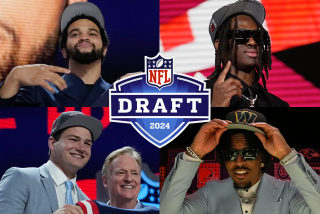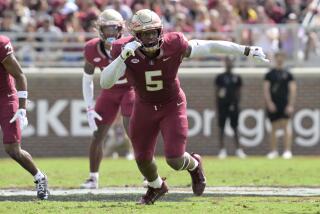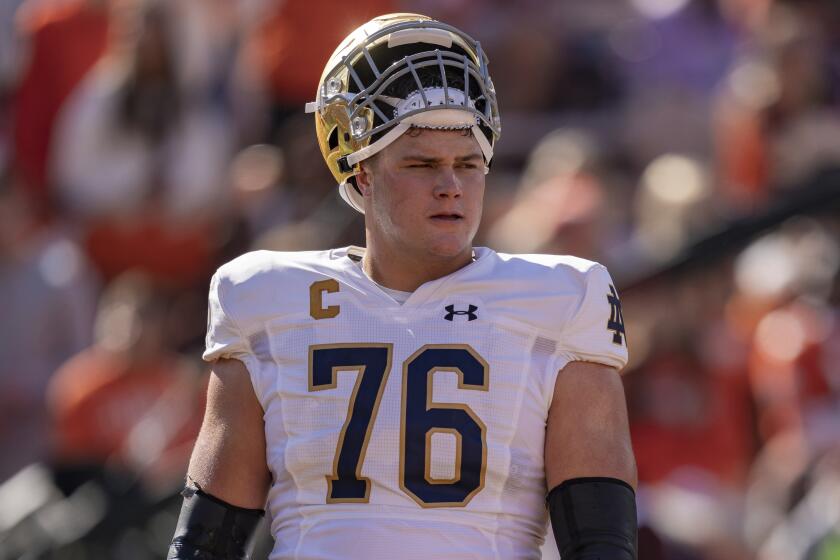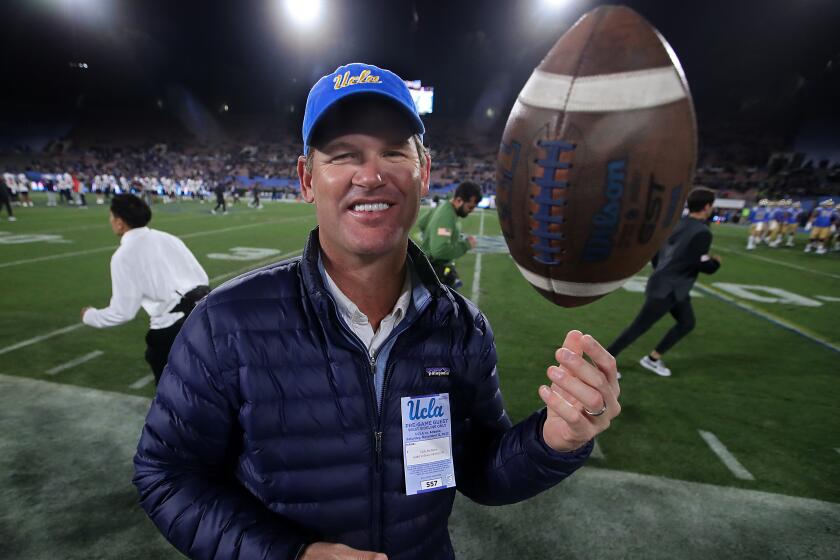Cubs a Winner for Tribune
The Chicago Cubs may be turning in a dismal on-field performance this year, but as a financial entity, it is still one of the most valuable franchises in pro sports.
That could be important if the Cubs’ owner, Tribune Co., remains under shareholder pressure to sell off corporate assets or there is a wholesale breakup of the media conglomerate.
The possibility that the Cubs might land on the market has prompted speculation on Wall Street and among sports experts about the team’s value, with most estimates settling in a range between $450 million and $550 million.
The lower figure would make the team the fifth- or sixth-most-valuable franchise in Major League Baseball even though the Cubs, currently in fifth place in the National League Central division, haven’t won a World Series since 1908.
“The Cubs’ attendance is always strong, it’s in a large, passionate baseball market and it has got a long history,” said Jeffrey S. Phillips, a director at the investment banking firm Houlihan Lokey Howard & Zukin who specializes in sports transactions.
Such a price would give the 130-year-old franchise about the same value as the Washington Nationals. As a new team, the Nationals’ fan base is largely conjectural, but it will have a state-of-the-art stadium as a draw.
The record price paid for a team continues to be held by the Boston Red Sox, whom the Cubs closely resemble in fan popularity, historical on-field record and cable TV revenue.
The Red Sox were sold in 2001 for $700 million, but nearly half of that price was for the team’s majority ownership in a regional cable sports network that carries its games.
As recently as two weeks ago, Tribune rebuffed an overture for the Cubs from former Cub star Ernie Banks, who said he represented a group of investors including former New York Mayor Rudolph Giuliani.
Tribune executives have said for the record that they have no intention of selling the team, which they regard as a core corporate holding.
Any sale would represent a huge nominal profit for Tribune -- and would saddle the company with a huge tax bill.
Tribune, parent company of the Los Angeles Times, bought the Cubs in 1981 for $20.5 million. Since then, the values of baseball franchises have soared, reflecting higher attendance across the league and richer broadcast and cable TV rights.
Annual earnings per team also have recovered handsomely from a financial nadir in 2001, when Commissioner of Baseball Bud Selig told Congress that only five of the 30 teams had turned a profit.
One of those was the Cubs, which Selig said made a mere $2.9 million in 2001.
Selig’s claim of league-wide financial devastation was undermined by the record-breaking sale of the Red Sox, which ostensibly was among the money-losing teams. Several factors might make the Cubs attractive to buyers. It is one of only two ballclubs -- the Red Sox being the other -- that have a large and passionate following despite decades of poor performance on the field. The Cubs haven’t played in a World Series since 1945.
The Cubs consistently play to near-capacity crowds at Wrigley Field, averaging 39,700 fans per game this year in a 41,118-seat stadium. Cubs tickets are the most expensive in the league after the Red Sox, averaging $34.30 per seat.
The team’s 1914-vintage stadium and its location, hemmed in by residential and commercial neighborhoods, would normally be regarded as shortcomings. But Wrigley Field’s historical cachet keeps fans coming despite the Cubs’ futility on the field.
“I don’t think you’d have people flocking out to see the Cubs lose in a different facility,” said Maury Brown, co-chairman of the business of baseball committee of the Society for American Baseball Research.
Another selling point: the Cubs’ national exposure on Tribune’s WGN “superstation,” a local TV station that also functions as a cable channel, carrying games to as many as 55 million viewers nationwide. The Cubs also are carried by a regional sports network operated by Comcast Corp. in which Tribune holds a 25% interest.
The terms of both deals are undisclosed, obscuring the Cubs’ true profitability. The value of the WGN contract is further muddied by Tribune’s ownership of both the team and the station, which gives the company leeway to shift profits and losses from one operation to another.
“Broadcast-related revenue is the wild card,” Phillips said.
Tribune bought the Cubs to provide programming for its expanding cable TV holdings -- borrowing a strategy pioneered in the 1970s by media maverick Ted Turner, who had acquired the Atlanta Braves to beef up his own superstation.
Other media giants followed suit in the 1990s. Walt Disney Co., owner of ESPN, bought the Anaheim Angels as well as the Mighty Ducks of Anaheim, envisioning the baseball and hockey teams as the foundation for a new regional sports network that would challenge News Corp.’s Fox Sports West channel.
However, News Corp. blocked Disney’s effort by purchasing the Los Angeles Dodgers and locking up TV rights that were essential to sustaining a regional sports channel.
Both Disney and News Corp. have since sold their teams, acknowledging that they lacked strategic merit. Today, Tribune is one of two corporate owners left in baseball.
Corporate ownership has lost luster for other reasons. As an operating asset of any large media conglomerate, a sports team is generally small potatoes. The Cubs’ operating revenue, estimated at less than $200 million a year, amounted to 3.5% of Tribune’s total revenue of $5.6 billion in 2005.
Professional sports teams tend to attract disproportionate negative attention from the media, the public and shareholders, especially when a high-profile player is involved. In 2005, for example Tribune disclosed that the Cubs’ trade of slugger Sammy Sosa to the Baltimore Orioles had reduced its quarterly profit by $13.5 million, or 3 cents a share, because of a contract technicality.
One question actively debated in the sports world is whether the Cubs would perform better under private, rather than corporate, ownership. Although the team has spent generously -- its 2006 opening-day payroll of $94.4 million ranked seventh in the league -- corporate managers are prevented from the no-holds-barred investments that often spell victory.
“Overall, the Cubs haven’t won, and I don’t think there’s a better metric,” said Andrew Zimbalist, an economist at Smith College and author of a 2006 examination of Selig’s leadership entitled “In the Best Interest of Baseball?” “On balance, it hasn’t been a successful ownership.”
*
(BEGIN TEXT OF INFOBOX)
Team statistics
Wrigley Field capacity: 41,118
Average attendance (home games through June 19): 39,696
Average ticket price: $34.30
Ticket price rank: No. 2 (after Boston Red Sox)
Opening day payroll: $94.4 million (7th highest)
Current place in National League Central: 5th
Last World Series appearance: 1945
Last World Series title: 1908
Sources: Times research
More to Read
Get our high school sports newsletter
Prep Rally is devoted to the SoCal high school sports experience, bringing you scores, stories and a behind-the-scenes look at what makes prep sports so popular.
You may occasionally receive promotional content from the Los Angeles Times.






